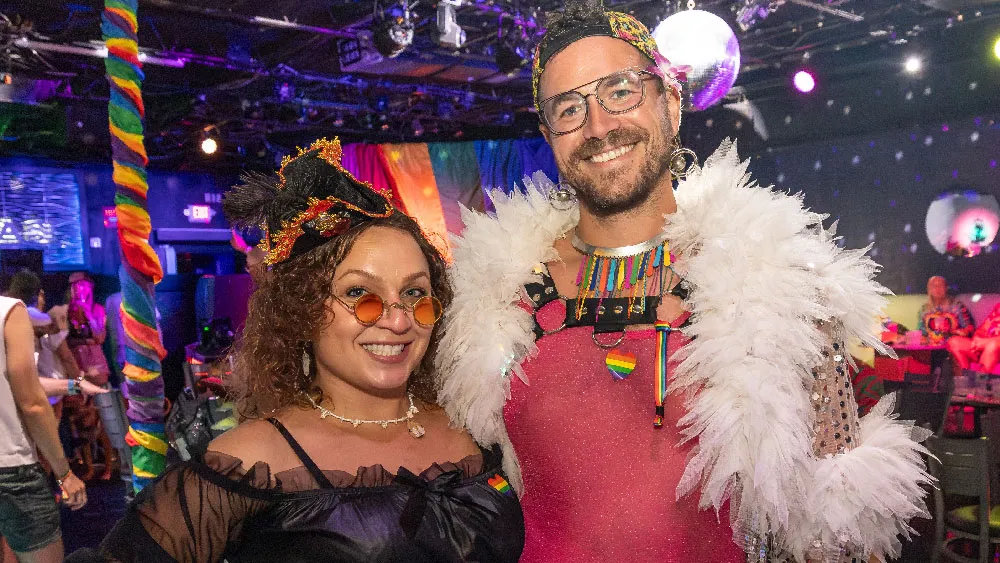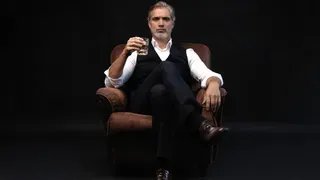February 9, 2015
Fascinating People :: Fred Karger
Kilian Melloy READ TIME: 10 MIN.
I first spoke with Fred Karger during his 2012 presidential run. The conversation was for an interview that remained unpublished (my editor at the time disliked what he saw as Karger's showboating), but perhaps there was something more cosmic than editorial preference at work. The interview had only been in progress for a short time when the sound of a fire alarm began to blare.
Fast forward to one snowy day recently, when EDGE (ensconced in the company headquarters in Boston) placed a call to Karger, who was in New York City at the time - a city also pummeled by snow and cold. Karger, eternally upbeat, cherished the nasty weather: "It's actually been fun for me," the California-based political consultant and activist said. "It's a break from the sunshine."
If you haven't heard of Karger, or about how he ran as what he called an "Independent Republican" for the official GOP nomination, or even if you haven't heard about how Karger ran as the first openly gay presidential candidate, don't feel too badly. Karger's campaign was never going to result in the nomination, much less a win on Election Day, but that wasn't really the point (as Karger tells EDGE below).
A sometime actor and longtime political operative, Karger has worked on a number of GOP presidential campaigns, but it's been his work in the trenches, fighting for equality for GLBT individuals and families, that has brought him notice - far more so than his presidential campaign. Karger has stood up against Prop 8, the California voter initiative that temporarily rescinded marriage rights for same-sex families in that state, and hounded one of Prop 8's biggest supporters, an anti-gay, right-wing group with the curious name of the National Organization for Marriage (curious because the group exists for the purpose of denying gays and lesbians the right to marry) over its seemingly lax approach to campaign finance laws in states where NOM has led the charge against legal family parity. (A glance at NOM's website proves revealing: Text there calls for an amendment to the United States Constitution for the purpose of undoing tens of thousands of marriages across the land ["It is critical not only to marriage but to the republican form of government in this country to amend the Constitution to reaffirm the meaning of marriage"] and - arguably worse - the frowning visage of "Duck Dynasty"'s homophobic patriarch glares at the viewer.)
With the GOP in full-throttle Cloud Cuckooland of late (finally, finally Mitt Romney decided not to put himself, and us, through the embarrassment of a third run at the Oval Office; now, won't Jeb please follow suit, lest we become embroiled in a third Bush presidency after the first two saw significant economic crashes, not to mention the worst terror attack America has ever known?), it seemed an auspicious time to chat with the fascinating Karger about his political career, his personal philosophy, and the question of what makes bigots run.
EDGE: You were the first openly gay candidate for President, running in 2012 as an independent Republican candidate. What was your motivation for that?
Fred Karger: Someone had to be first. By opening the door, I think it might encourage the next openly gay candidate. Maybe a Democrat next time.
EDGE: Increasingly, gay conservatives are becoming visible and they seem less and less of an oxymoron. What draws you personally to the conservative message?
Fred Karger: I consider myself much more of a moderate or progressive, even though I'm a Republican. I hearken back to Theodore Roosevelt, who was the first progressive Republican president... and last progressive Republican president. He was much more liberal than the Democrats of the time, and much more concerned with civil rights and human rights than the Democrats of the time. Really, one of the reasons I ran was out of a hope of leading the party back to its roots of Lincoln and Roosevelt and other moderates. Also, I thought it was important to still talk about conservative values like smaller government, compassion, balancing the budget - which was much more relevant two years ago than it is now. Law and order. Education was also one of my major platforms; I had some ideas to change that.
EDGE: What has your work on various presidential campaigns (including Ronald Reagan's) as well as your own presidential run taught you about our electoral process? Are those who worry about money in politics fraying the democratic process right to worry?
Fred Karger: I travel around a fair amount and I still love coming back to this country, to realize how lucky we are and why so many people try and come here. This is the best place to be. We need to remember that. We need to remember that citizens of this country care about this nation more than anything. They might not always show it on a day to day basis, but when a crisis occurs you see that patriotism come to the forefront. As we prosper, we need to share that prosperity with other Americans, and folks in the rest of the world, who are not as fortunate. We need to [support efforts] in medicine and education in under-develop regions and, conversely, we need to learn from them in areas where we can grow and learn, as well. We have that responsibility.
EDGE: Do you suppose you would run for office again some day?
Fred Karger: I don't think so. I thought about running possibly, in 2016, and considered different options; the more I looked at it, the more I thought it's probably best to quit while I was ahead. We did a good job in 2012; we made it to six state ballots and did well in various caucuses around the country. We put [my run] together pretty well and came through unscathed.
I was a frustrated candidate my whole life because I always wanted to run for office, but I had a deep, dark secret of being gay that I could never tell, because I thought that would end my career. Certainly, [that's how it was] in the '70s when I got started in politics as a professional, and the '80s and '90s, and even into this century. It was a secret you had to keep [not just as a candidate] but even as a consultant, and not just a Republican. I had plenty of friends who were Democratic consultants who were also gay, and who were also very closeted. But once I came out publicly in 2008, on the Prop 8 campaign, not all that many years ago - and I was 58 at the time - I then had every door opened to me, many of them that would not have been [previously] because I was gay. I really enjoyed that two and a half year run for president. I think my campaign days are over, but never say never.
EDGE: Since running for president, you have been engaged in a one-man battle with anti-marriage group NOM. Given our recent gains in marriage equality, do we need to pay any attention to NOM any longer? Aren't they thoroughly de-fanged at this point?
Fred Karger: Well, they are and they aren't. They still raise millions of dollars every year, and they do it from a very small handful of donors. While they are $2 million in debt now, that's just one phone call. They have donors who give them two or three or five million dollars.
Their problem is, the battle is over. The Supreme Court will make the decision in June, and I am very confident that we will prevail in the Court. It will either be in those four states [that the case the Court will hear concerns], or all fifty states [if the Court rules more broadly than it has so far on the issue of marriage equality], so it's just a question of time thanks to what the Supreme Court has already done.
But [NOM] still is working to expand their reach. They've got a [new] office in my home state of California. It's called Privacy for All Students. There was a law passed by the legislature establishing bathrooms and locker rooms for transgender students, and the second that was signed by the governor NOM led the charge and tried to put a referendum [to repeal the law] on the ballot. It takes a lot of signatures, and they were 17,000 signatures short.
But [they aren't going away], they tried to branch off into that area [of attacking trans rights]. Their biggest donor gave $200,000, and a lot of their other big donors gave them money [for that repeal effort]. Their political consultant was running the operation and getting paid by the campaign committee. So, they've branched out into other areas, and Brian Brown makes a handsome living of, from what looks like, from we can see, half a million dollars a year, so I don't think he's ready to give that up quite yet. He has eight kids. I don't think they're just going to go away.
They are also working internationally. [Brown] has been to Russia at least twice. I've filed a complaint charging him with a Logan Act violation, which is working with a foreign government against the best interest of the United States, and that's being investigated by the Justice Department. I will continue to watch them wherever they go, as long as they are in business. I was very pleased when I got notified that the state ethics office of California, the Fair Political Practices Commission, is going to investigate NOM and its major donors over that [failed] referendum, because once they didn't qualify they just went away and didn't file all the necessary campaign reports you have to by law. In California, if that's done with intent it can be a criminal violation, too. Seven major donors didn't file reports as required.
That investigation is going on, [plus similar investigations in] Hawaii, Iowa, Maine... in Maine they were fined $50,000, a record fine -- it doubled the record in Maine. I have an earlier California filing [against NOM] as well as federal ones I filed against Santorum, NOM, and this guy, Bob Vander Plaats from Iowa, who's a real hater - that's a [possible case] of money laundering because of Vander Plaats' endorsement of Santorum, which I contend NOM paid for, and I presented the federal election commission with evidence. Wherever I can, I will continue to dog them... to make sure they are going to abide by the law.
EDGE: As you pointed out, it's possible to make a handsome living as a professional homophobe. But what drives anti-gay fanatics like Maggie Gallagher, Brian Brown, or for that matter, Tony Perkins? Is that really what's behind their attacks on us?
Fred Karger: I'm through about that, in terms of doing my research. To be successful, you have to get into the heads of your opponents, like you would with a political campaign. I don't know Tony Perkins, I haven't looked into him as much as Brian and Maggie... They have become famous over their anti-gay activism. I don't know what they would be doing without NOM and some of these other organizations some of these religious right people fund. But I think they enjoy the attention; they're on TV, they speak before [powerful people], they throw money around... NOM had about a $16 million budget two or three years ago. That's a lot of money for a start-up. They only started in 2007. They became a force to be reckoned with because they were set up as a front group, where people could put money into they organization without being discovered - when you set up a 501(c) (4) or a 501(c) (3), those contributions are anonymous. They become very political.
With Maggie, you can see very clearly she's a jilted woman who was impregnated in college had a baby, and the father took off and she was supposed to raise the child as a single mom - which I commend her for, but you can see in every interview and in her writing that she's very bitter about that experience, and it permeates everything she does. Brian Brown, I think he's a very devout uber-Catholic, and that motivates him. He got to go to Rome and meet with the Pope, it was like a corporate conference on marriage a couple of months ago - I don't know if you remember that - I'm sure that for Brian Brown and Maggie, it was the most exciting moment of their lives to be in a room with the Pope. But she's kind of pulled away; there's been a big rift between those two: He overthrew her; she ran the organization, hired him, and then suddenly she's out and he's the president. Anyway, she'd be an awful person to work for, and Brian [would be] no better. You've got a lot of inside politics going on in that operation, the board, the Mormon church that set them up has pulled away from NOM because it's getting a little too hot. There have been some interesting developments, but I don't think they're going to pull up their tents and go away.
EDGE: You run a group called Californians Against Hate. At what point would you say your group would be comfortable calling it a day and bringing in its shingle? At what point will we be so integrated into American society that we no longer need groups to defend our interests?
Fred Karger I was just talking on Al Jazeera last week, and they asked me, "What's next after marriage?" - because I had declared victory. I don't believe in being too confident, but there's no way the Supreme Court could go in the other direction.
We've got many issues. Certainly, either what
Marriage, to me, is a symbol. It's so important in what it accomplishes, but more importantly it sends a message to young LGBT people around the world that, "You are equal." I've always equated it to the civil rights act for African Americans in 1964. There were still a lot of problems then, and still are, but it send a message to everyone around the country that you are now equal if you are African American. It's important psychologically. Think of what the Supreme Court might do in June for young LGBT kids.
EDGE: Thank you for your leadership, and thanks for this chat.
Fred Karger: I hope we meet again some day - without the fire drill!
Kilian Melloy serves as EDGE Media Network's Associate Arts Editor and Staff Contributor. His professional memberships include the National Lesbian & Gay Journalists Association, the Boston Online Film Critics Association, The Gay and Lesbian Entertainment Critics Association, and the Boston Theater Critics Association's Elliot Norton Awards Committee.





